B1U1 Friendship固学案2
- 格式:doc
- 大小:94.50 KB
- 文档页数:8
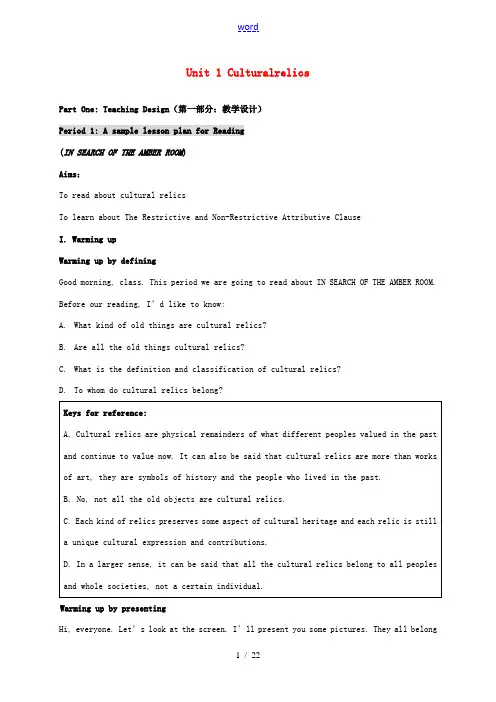
Unit 1 CulturalrelicsPart One: Teaching Design(第一部分:教学设计)Period 1: A sample lesson plan for Reading(IN SEARCH OF THE AMBER ROOM)Aims:To read about cultural relicsTo learn about The Restrictive and Non-Restrictive Attributive ClauseI. Warming upWarming up by definingGood morning, class. This period we are going to read about IN SEARCH OF THE AMBER ROOM. Before our reading, I’d like to know:A.What kind of old things are cultural relics?B.Are all the old things cultural relics?C.What is the definition and classification of cultural relics?D.To whom do cultural relics belong?Warming up by presentingHi, everyone. Let’s look at the screen. I’ll present you some pictures. They all belongto cultural relics. Some of them are cultural sites. Some of them are natural sites. Please think these over:A.Can you name them out?B.Who have the right to confirm and classify them?Warming up by discussingNow, boys and girls, I met a “moral dilemma”. That means I must make a choice between the interests of the family and the interests of the society. Things are like this: My old granny happened to find an ancient vase under the tree in the earth of our garden. It’s so beautiful and special. Now, my family fell into a moral dilemma. Can you help us to make a decision:A: What should we do?B: Can we keep it for ourselves or report it to the government?C: Have you e across such a situation — to make a difficult choice?II. Pre-reading1. Looking and sayingWork in pairs. Look at the photos on the screen. All these relics are quite beautiful. But some of them were lost and ruined in history,such as Yuan MingYuan and the Amber Room.Please guess:A.What kinds of things can result in their disappearing?B.Why do they e into being once again?2. Explaining and sharingWork in groups of four. Tell your groupmates:A.What do you know about the substance of “amber”?B.What do you know about the cultural relics “the Amber Room”?III. Reading1. Reading aloud to the recordingNow please listen and read aloud to the recording of the text IN SEARCH OF THE AMBER ROOM. Pay attention to the pronunciation of each word and the pauses within each sentence. I will play the tape twice and you shall read aloud twice, too.2. Skimming and identifying the general idea of each paragraphNow please skim the text to get the key words and general idea of each paragraph.3.Scanning and analyzing the characteristics of the text.Since you have got to know the general ideas of each paragraph, can you tell me the characteristics of the passage, such as, the type of writing, the way of narrating, and the tense?4.Reading and understandingNext you are to read and underline all the useful expressions or collocations in the passage. Copy them to your notebook after class as homework.5. Reading and transferring informationRead the text again to plete the table, which lists all the numbers in the text.6.Reading and learningRead the text and learn more about the following proper nouns. You can surf on the website after class:Ⅳ Closing downClosing down by doing exercisesTo end the lesson you are to do the prehending exercises No.1 and No.2.Closing down by having a discussionA.Can you imagine the fate of the Amber Room? What is it?B.Do you think if it is worthwhile to reproduce the Amber Room? Why?Closing down by retelling the story of the Amber RoomWell, all of us have learned the history of the Amber Room. Let’s recall some key wordsand expressions on the board. You are to retell the story of the Amber Room:Period 2: A lesson plan for Learning about Language(The Restrictive and Non-Restrictive Attributive Clause)Aims:To learn about the restrictive and non-restrictive attributive clauseTo discover some usefulwords and expressionsTo discover some useful structuresProcedures:I. Warming upWarming up by discovering useful words and expressionsPlease turn to page 3. Do exercises 1, 2, 3 and 4 first. Please check your answers against your classmates’.Warming up by explainingNow, class, since you’ve read the passage, could you explain to me how to use the phrase “belong to”? The word “to” here is a preposition, indicating the possession, and is always followed by nouns or pronoun. Look at Ex 3. The preposition “at”indicates a state, condition or continuous activity. So we can replace them or express them by using a present-continuous tense.II. Learning aboutAttributive Clause1. What is an adjective Clause?An adjective clause is a dependent clause which takes the place of an adjective in another clause or phrase. Like an adjective, an adjective clause modifies a noun or pronoun, answering questions like “which?” or “what kind of?” Consider the following examples: Adjectivethe red coatAdjective clausethe coat which I bought yesterdayLike the word “red” in the first example, the dependent clause “which I bought yesterday” in the second example modifies the noun “coat.” Note that an adjective clause usually es after what it modifies, while an adjective usually es before.In formal writing, an adjective clause begins with the relative pronouns “who(m),” “that,” or “which.” In informal writing or speech, you may leave out the relative pronoun when it is not the subject of the adjective clause, but you should usually include the relative pronoun in formal, academic writing:informalThe books people read were mainly religious.formalThe books that people read were mainly religious.informalSome firefighters never meet the people they save.formalSome firefighters never meet the people whom they save.Here are some more examples of adjective clauses:the meat which they ate was taintedThis clause modifies the noun “meat” and answers the question “which meat?”.They’re talking about the movie which made him cryThis clause modifies the noun “movie” and answers the question “which movie?”.They are searching for the student who borrowed the bookThe clause modifies the pronoun “student” and answers the question “which student?”.Did I tell you about the author whom I met?The clause modifies the noun “author” and answers the question “which author?”.2. Restrictive & non restrictive clausesDo the following pairs of sentences mean the same thing?1a My uncle, who lives in London, is very rich.2b My uncle who lives in London is very rich.2a The policies, which were unpopular, were rejected by the voters.2b The policies which were unpopular were rejected by the voters.3a My niece, whose husband is out of work, will inherit the house, which I have always treasured.3b My niece whose husband is out of work will inherit the house which I have always treasured. The first sentence in each pair has a non-restrictive clause within two mas, and the second has a restrictive clause. A non-restrictive clause simply adds more information into the sentence and does not affect the meaning of the main clause: it is therefore bracketed off with mas (1a = an uncle who happens to live in London). Conversely, a restrictive clause defines its referent in the main clause more specifically and contributes significantly to the meaning of the sentence. Thus it is that particular uncle who lives in London who is referred to (1b). In 2a, all policies were unpopular and all were rejected, whereas in 2b only the policies that were unpopular were rejected. Note that in restrictive clauses the non-human relative pronoun is ei ther ‘that’ or ‘which’, whereas for human referents the relative pronoun can be either ‘who/m’ or ‘that’ (the man that/whom I will marry ....).3. A test on FORMAL ADJECTIVE CLAUSESDirections: bine the sentences. Use formal written English.Use (b) as an adjective clause. Punctuate carefully.1) (a) An antecedent is a word. (b) A pronoun refers to this word.An antecedent ____2) (a) The blue whale is considered the largest animal that has ever lived.(b) It can grow to 100 feet and 150 tons.The blue whale ____3) (a) The plane was met by a crowd of 300. (b) Some of them had been waiting for more than4 hours.The plane ____4) (a) In this paper, I will describe the basic process.(b) Raw cotton bees cotton thread by this process.In this paper, I will describe ____5) (a) The researchers are doing case studies of people to determine the importance of heredity in health and longevity.(b) These people’s families have a history of high blood pressure and heart disease.The researchers are doing case studies ____6) (a) At the end of this month, scientists at the institute will conduct their AIDS research.(b) The results of this research will be published within 6 months.At the end of this month, scientists ____7) (a) According to many education offic ials, ‘math phobia’(that is, a fear of mathematics) is a widespread problem. (b) A solution to this problem must and can be found. According to many education officials, ‘math phobia’ ____8) (a) The art museum hopes to hire a new administrator.(b) Unde r this person’s direction it will be able to purchase significant pieces of art. The art museum ____9) (a) The giant anteater licks up ants for its dinner.(b) Its tongue is longer than 30 centimeters (12 inches).The giant anteater ____10) (a) The a nteater’s tongue is sticky.(b) It can go in and out of its mouth 160 times a minute.The anteater’s tongue ____III. Closing down by taking a quizQuiz on Attributive clauseSelect one answer from the choices provided after each sentence. The words you choose should fit the blank in the sentence. Don’t use the HINT buttons unless you really need them.1. As many children came were given some cakes.A.thatB. asC. whoD. whom2. The visitors saw rows of houses the roofs are red.A. on whichB. of whichC. whereD. that3. I usually take a nap after lunch, is my habit.A. which itB. as itC. asD. that4. Please tell me the way you did the job.A. howB. whereC. whichD. in which5 Is this museum some German friends visited the day before yesterday?A. the oneB. whichC. thatD. where6. The farmer uses wood to build a house to store grain.A. in whichB. whereC. thatD. with which7. I shall never forget the years I spent in the country with the farmers,has a great effecton my life.A. when, whichB. that, whichC. when, thatD. which, that8. Little has been done is helpful to our work.A. thatB. whatC. whichD. all that9. Perhaps this is the only market you can get such cheap goods.A. thatB. of whichC. by whichD. where10. We’ll put off the outing until next week, __ we won’t be so busy.A. whenB. whichC. at whichD. in thatKey: 1~10:BBCDA ABADAPeriod 3: A lesson plan for using languageAims:To learn to tell facts from opinionsTo write a reply letterTo listen and speak about cultural relicsProceduresI. Warming upWarming up by questionsMorning, class. We always say,“We must respect facts and can’t wholly depend on one’s opinions”. But can you tell me:A.What does it mean when you say,“I t is a fact”?B.What does it mean when you say,“I t is an opinion”?Warming up by questioningTurn to page 5. Read the passage and tell me:A.If you want to go in for law against somebody, and if you want to win, what’s themostimportant thing you should do first?B.What makes a judge decide which eyewitnesses to believe and which not to believe.II. Guided reading1.Reading and definingRead the passage and define: What is a fact? What is an opinion? What is an evidence?2. Reading and translatingRead the passage and translate it into Chinese paragraph by paragraph. Tom, you are to do paragraph 1, please…3. Reading and underliningNext you are to read and underline all the useful expressions or collocations in the part. Copy them to your notebook after class as homework.4. ListeningNow, boys and girls, as we know, people have never stopped searching for the Amber Room.This time we’ll listen to what three people say they know about the missing Amber Room.Before we listen to them, I’ll present some related new words to you to help you understand them easily. Please look at the screen and read after me.5. Sharing and CorrectingWell done. Now share your forms with your partner and tell mein the three forms: What are facts? What are opinions? Li Ming, do you want a try?6. ReviewingWe often use some expressions to ask for opinions. What are they?Oh, yes. What do you think of …?Do you believe …?How can you be sure of …?How do you know that?And we often use some expressions to give opinions. What are they? Ok, Tom, Please. Oh, yes. They are:I think… / I don’t think…I don’t agree that… / I suppose that…7. DiscussingPlease look at exercise 3, and discuss which person gave the best evidence. Use the expressions above to help you. Before we discuss, let’s deal with the following discussion:A.What is the best evidence?B.How can we know which eyewitness is most believable?Well done. Let’s e to the discussion “Which person gave the best evidence?”8. Reading and writingSometimes we may fall into or face a moral choice. That is a moral dilemma. Let’s read the letter on page 7 and see what’s Johann’s choice and opinion. Ok, finished? Now answer the following questions:A.What’s Johann’s opinion about the Amber Room?B.What’s his father’s opinion about the things found by him?C.What happened to Johann when she was a pupil?9. pleting the letters A & B and then giving your own letters·When you write your letter, you may choose to agree or not agree with the writer. ·You must give a reason why you agree or don’t agree with the writer.·Be sure to give an example from your own life so that the reader can better understand your opinion.Ⅲ Closing downClosing down by a debatingThere is a long ancient wall around a less developed town.It is reported it has a longhistory, dating back to over 5 century BC. The local government is collecting money to repairand rebuild the wall. It has cost a lot of money. Some of your classmates think it is not worth. Some think it’s a good way to develop the local economy. Now Group 1 and 2 against Group 3 and 4. Let’s have the debating.Closing down by dictation·The design for the room was of the fancy style popular in those days.·The room served as a small reception hall for important visitors.·The man who found the relics insist that it belongs to his family.·The room was pleted the way she wanted it .·It was ready for the people of St. Petersburg to celebrate the 300th birthday of their city.·After that, what really happened to the Amber Room remains a mystery.·In a trial, a judge must decide which eyewitnesses to believe and which not to believe. ·Is it something that more than one person believes?·A fact is anything that can be proved.·An opinion is what someone believes is true but has not been proved.Part Two: Teaching Resources (教学资源)Section 1: A text structure analysis of IN SEARCH OF THE AMBER ROOMI.Type of writing and summary of the ideaII. A tree diagramSection 2:Background information on culture relicsI. What is a culture relic? 何谓“文化遗产”?Cultural relics are physical reminders of what different peoples valued in the past and continue to value now. Without these relics, we could not cherish cultural traditions as much or appreciate the lives of the people who practiced those traditions. Although we may not often consider it, cultural relics are not only the possession of one culture. In a larger sense, it can be said that they belong to all peoples. For these reasons, this unit describes cultural relics not from China but other places. Looking at it from another angle, it can also be said that cultural relics preserves some aspect of cultural heritage and each relic, regardless of whether the same hands created many examples of it, is still a unique cultural expression and contribution.II.The cultural relics of China in the world heritage site list《世界文化遗产名录》中的30处中国文遗产本单元的主题是“文化遗产”,学生很可能已经亲身接触过当地的文化遗产,或是能过电视、报纸等媒体对此有了一定的了解,因此,在课前教师可让学生列举国内外著名的文化遗产,然后对“文化遗产”给出定义、分类或划分标准。
![[学习资料]高中英语《unit 1 friendship》学案2新人教版必修1](https://uimg.taocdn.com/1f6d67fbc1c708a1284a4432.webp)
《Unit 1 Friendship》Period 2 Pre-reading and ReadingLearning aim: Practise listening , general comprehending , deep comprehending Teaching procedure1)Pre-reading proverbs1. A friend is a gift you give yourself.2. A cheerful friend is like a sunny day spreading brightness all around.快乐的朋友犹如阳光灿烂的日子使明媚无处不在。
3. A friend in need is a friend indeed.4. The secret to friendship is being a good listener.1.Why do you need friends ? Make a list of reasons why friends are important to you._____________________________________________________________________________________________________________________________________2.Does a friend always have to be a person ? What else can be your friend?_______________________________________________________________________________________________________________________________3.Skim the first paragraph of the reading passage below a nd find who was anne's best friend.__________________________________________________________________________________________________________________________________________2)Reading ANNE’S BEST FRIEND1.listen to the tape and join the correct parts of the sentences.5’1.Anne kept a diary because A. she couldn't meet her friends.2.She felt very lonely because B.Jews were caught by Nazis and killed3.They had to hide because C. she could tell to it everything4.Anne named her diary Kitty because D. she wanted it to be her best friend.2.Skim the text and Tell which of the following are true(T) or false(F)1.Anne made her diary her best friend because she had no frie nd at school.( )2.Anne could not go outside because she was afraid she was caught, ( )3.In her hiding place, the deep blue sky, the song of the birds and so on madeAnne crazy. ( )4.One night Anne stayed awake in order to see the moon face to face. ( )5.The whole passage tells us how Anne survived in her hiding place. ( ) 3.Scan the text and choose the best ans wer according to the text.1.What made Anne crazy about nature?a.Her interest in nature,b.She had no friend,c.She couldn’t get outdoors for a long time.d.She could do nothing but watch nature,2.From the diary we can in fer that___________.a.Anne was a girl who loves natureb.Anne was good at writing diariesc.Anne was longing for a normal life and she especially missed going outsideand enjoying natured.Anne had good observation in her daily life.3.What is the author’s attitude towards Anne in this passage?a.Angryb.Happy .c.Sorry,.d.Disappointed4.The story mainly tells us that _________.a.Anne’best friend was a girl calle d Kittyb.Anne set down what had happened in her diaryc.Anne kept diaries in her hiding place and she treated her diary as her bestfriendd.Anne admired nature very much and often stayed up late to watch the moonthrough the windows.5.Anne thought it no pleasure looking at nature through the curtains because ___a.the curtains were dirty and made her feel unpleasantb.the curtains stopped her from seeing nature clearlyc.what she could see through the curtains was limitedd,nature was really something that must be experienced6.In Anne’s eyes, a best friend is someone_______.a.who would not laugh at youb.who understands what you have gone throughc,whom you could tell everything tod.who can help you when you are in trouble4.Read the text carefully and fill in the blanks according to the text.During World War II, Anne and her family had to ___1___ from being discovered by the ___2___ Nazis. It was because she was ___3___ so long that she felt___4___ na ture ___5___. Even one evening she stayed awake ___6___ 11;30 ___7___ look at the moon ___8___ for herself, She was so lonely that she wanted a ___9___ friend who she can tell things like deepest ___10___ and thoughts, In that situation, she made ___11___ her best friend which she called Kitty, But she said she didn’t want to ___12___ a series of facts ___13___ most people did,3)Listen and follow the tape or recite th e important sentences or text4)A reading passage in English weekly o r discuss how to be a good friend in groups5)Homework part2 in ENGLISH WEEKLY。
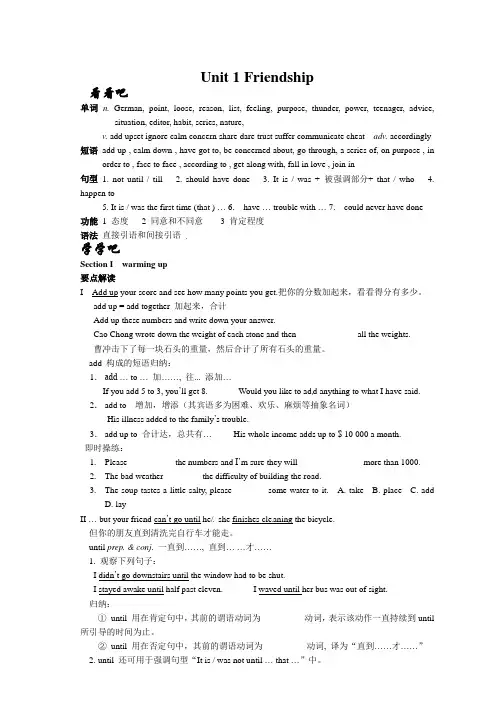
Unit 1 Friendship看看吧单词n. German, point, loose, reason, list, feeling, purpose, thunder, power, teenager, advice, situation, editor, habit, series, nature,v. add upset ignore calm concern share dare trust suffer communicate cheat adv. accordingly 短语add up , calm down , have got to, be concerned about, go through, a series of, on purpose , in order to , face to face , according to , get along with, fall in love , join in句型1. not until / till 2. should have done 3. It is / was + 被强调部分+ that / who 4. happen to5. It is / was the first time (that ) …6. have … trouble with …7. could never have done功能1 态度 2 同意和不同意 3 肯定程度语法直接引语和间接引语学学吧Section I warming up要点解读I Add up your score and see how many points you get.把你的分数加起来,看看得分有多少。
add up = add together 加起来,合计Add up these numbers and write down your answer.Cao Chong wrote down the weight of each stone and then _____________ all the weights.曹冲击下了每一块石头的重量,然后合计了所有石头的重量。
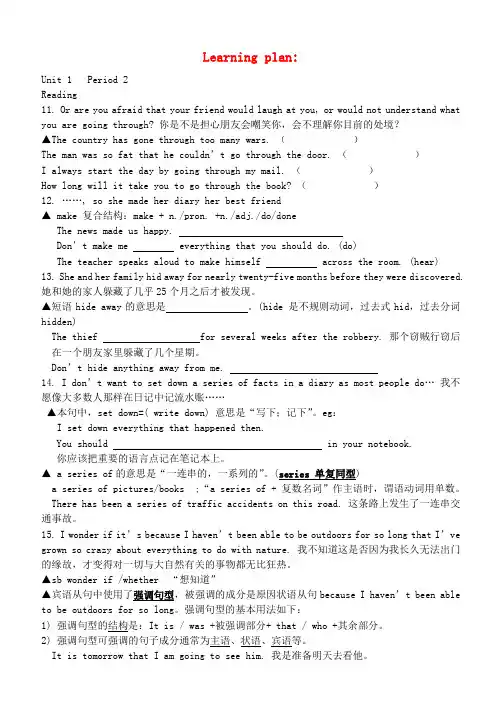
Learning plan:Unit 1 Period 2Reading11. Or are you afraid that your friend would laugh at you, or would not understand what you are going through? 你是不是担心朋友会嘲笑你,会不理解你目前的处境?▲The country has gone through too many wars. ()The man was so fat that he couldn’t go through the door. ()I always start the day by going through my mail. ()How long will it take you to go through the book? ()12. ……, so she made her diary her best friend▲ make 复合结构:make + n./pron. +n./adj./do/doneThe news made us happy.Don’t make me everything that you should do. (do)The teacher speaks aloud to make himself across the room. (hear)13. She and her family hid away for nearly twenty-five months before they were discovered. 她和她的家人躲藏了几乎25个月之后才被发现。
▲短语hide away的意思是。
(hide 是不规则动词,过去式hid,过去分词hidden)The thief for several weeks after the robbery. 那个窃贼行窃后在一个朋友家里躲藏了几个星期。
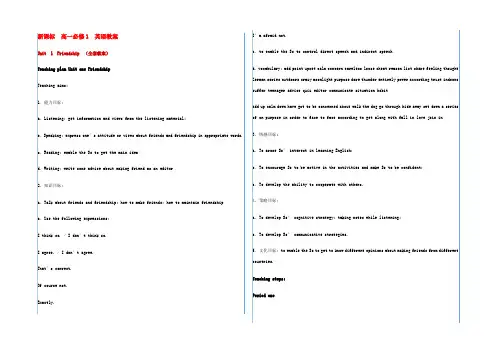
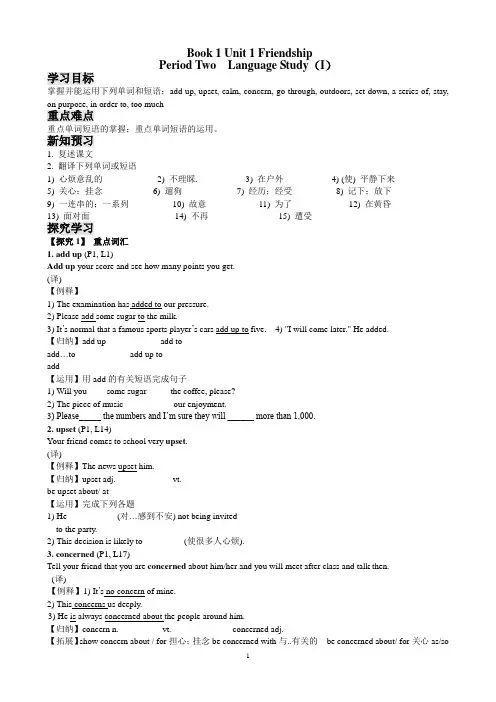
Book 1 Unit 1 FriendshipPeriod Two Language Study(I)学习目标掌握并能运用下列单词和短语:add up, upset, calm, concern, go through, outdoors, set down, a series of, stay, on purpose, in order to, too much重点难点重点单词短语的掌握;重点单词短语的运用。
新知预习1. 复述课文2.翻译下列单词或短语1) 心烦意乱的____________ 2) 不理睬.___________3) 在户外___________4) (使) 平静下来____________ 5) 关心;挂念___________ 6) 遛狗____________ 7) 经历;经受__________8) 记下;放下___________ 9) 一连串的;一系列__________10) 故意___________11) 为了_____________12) 在黄昏___________ 13) 面对面___________________ 14) 不再________________15) 遭受_____________探究学习【探究1】重点词汇1. add up (P1, L1)Add up your score and see how many points you get.(译)_______________________________________【例释】1) The examination has added to our pressure.2) Please add some sugar to the milk.3) It’s normal that a famous sports player’s cars add up to five. 4) "I will come later." He added.【归纳】add up____________ add to ________ ____add…to____________ add up to____________add________________【运用】用add的有关短语完成句子1) Will you ____some sugar _____the coffee, please?2) The piece of music ___________our enjoyment.3) Please_____ the numbers and I’m sure they will ______ more than 1,000.2.upset (P1, L14)Y our friend comes to school very upset.(译) ________________________________【例释】The news upset him.【归纳】upset adj. ____________ vt._____________be upset about/ at _____________________________【运用】完成下列各题1) He ___________(对…感到不安) not being invitedto the party.2) This decision is likely to _________(使很多人心烦).3. concerned (P1, L17)Tell your friend that you are concerned about him/her and you will meet after class and talk then.(译)______________________________________【例释】1) It’s no concern of mine.2) This concerns us deeply.3) He is always concerned about the people around him.【归纳】concern n. _________ vt. _____________ concerned adj._________【拓展】show concern about / for担心;挂念be concerned with与..有关的be concerned about/ for关心as/sofar as… be concerned就…而言【运用】完成下列句子1) She ______ a great deal of _______ (担心) about her son’s illness.2) He _______________ (与……有关) the matter.3) _____________(据我所知), he is the first in our class.4.go through (P2, L3)Are you afraid that your friend would laugh at you, or would not understand what you are going through? (译) _____________________________________【例释】1) They went through our luggage at the customs.2) Let's go through the exercises.3) Iraq has gone through too many wars.4) The river goes through the city.5) The piano went through the door easily.6) We've gone through all those envelopes I bought last week.【归纳】go through________________________【运用】完成句子1) He _________ (经历) one difficulty after another.2) Our plan on how to spend our summer holidays _____________(没通过).3) Y ou must ___________(检查)your papers before you hand them in.5. outdoors (P2 L10) crazy (P2, L11)I wonder if it’s because I haven’t been able to be outdoors for so long that I’ve grown so crazy about everything to do with nature.(译)______________________________________【例释1】1) He used to lead an outdoor life.2) There is a big indoor swimming pool in this hotel.【归纳1】outdoor / indoor adj._______;________ /______ outdoors / indoors adv.__________ / ______【运用1】完成句子1) He likes watching most_______________games. 他喜欢观看大部分的室外运动项目。
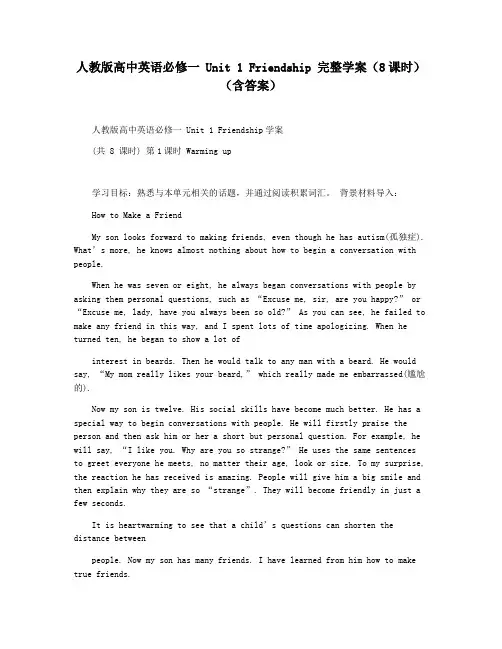
人教版高中英语必修一 Unit 1 Friendship 完整学案(8课时)(含答案)人教版高中英语必修一 Unit 1 Friendship学案(共 8 课时) 第1课时 Warming up学习目标:熟悉与本单元相关的话题,并通过阅读积累词汇。
背景材料导入:How to Make a FriendMy son looks forward to making friends, even though he has autism(孤独症). What’s more, he knows almost nothing about how to begin a conversation with people.When he was seven or eight, he always began conversations with people by asking them persona l questions, such as “Excuse me, sir, are you happy?” or “Excuse me, lady, have you always been so old?” As you can see, he failed to make any friend in this way, and I spent lots of time apologizing. When he turned ten, he began to show a lot ofinterest in beards. Then he would talk to any man with a beard. He would say, “My mom really likes your beard,” which really made me embarrassed(尴尬的).Now my son is twelve. His social skills have become much better. He has a special way to begin conversations with people. He will firstly praise the person and then ask him or her a short but personal question. For example, he will say, “I like you. Why are you so strange?” He uses the same sentences to greet everyone he meets, no matter their age, look or size. To my surprise, the reaction he has received is amazing. People will give him a big smile and then explain why they are so “strange”. They will become friendly in just a few seconds.It is heartwarming to see that a child’s questions can shorten the distance betweenpeople. Now my son has many friends. I have learned from him how to make true friends.Ⅰ.单词短语注释:1.looks forward to期望,盼望。
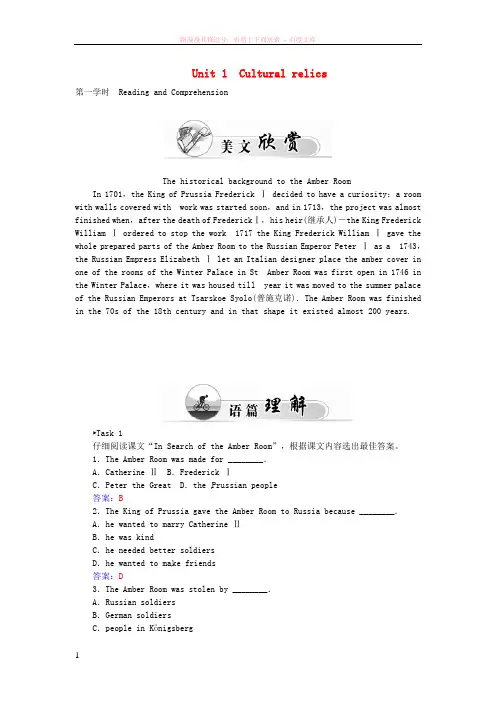
Unit 1 Cultural relics第一学时Reading and ComprehensionThe historical background to the Amber RoomIn 1701,the King of Prussia Frederick Ⅰ decided to have a curiosity:a room with walls covered with work was started soon,and in 1713,the project was almost finished when,after the death of FrederickⅠ,his heir(继承人)-the King Frederick William Ⅰ ordered to stop the work 1717 the King Frederick William Ⅰ gave the whole prepared parts of the Amber Room to the Russian Emperor Peter Ⅰ as a 1743,the Russian Empress Elizabeth Ⅰ let an Italian designer place the amber cover in one of the rooms of the Winter Palace in St Amber Room was first open in 1746 in the Winter Palace,where it was housed till year it was moved to the summer palace of the Russian Emperors at Tsarskoe Syolo(普施克诺).The Amber Room was finished in the 70s of the 18th century and in that shape it existed almost 200 years.►Task 1仔细阅读课文“In Search of the Amber Room”,根据课文内容选出最佳答案。
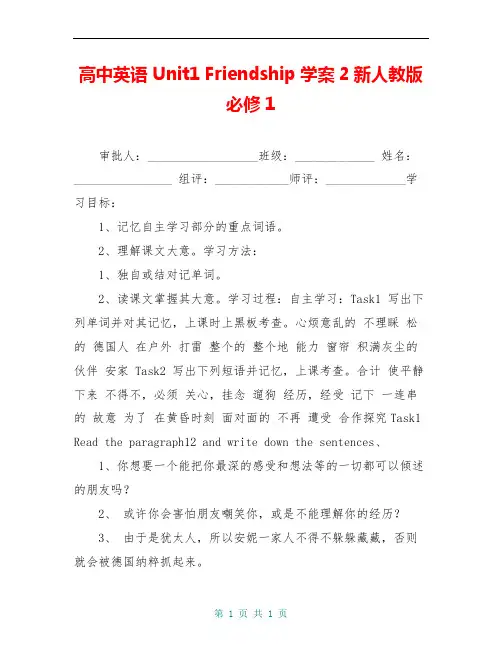
高中英语 Unit1 Friendship学案2新人教版必修1审批人:__________________班级:_____________ 姓名:________________ 组评:____________师评:_____________学习目标:1、记忆自主学习部分的重点词语。
2、理解课文大意。
学习方法:1、独自或结对记单词。
2、读课文掌握其大意。
学习过程:自主学习:Task1 写出下列单词并对其记忆,上课时上黑板考查。
心烦意乱的不理睬松的德国人在户外打雷整个的整个地能力窗帘积满灰尘的伙伴安家 Task2 写出下列短语并记忆,上课考查。
合计使平静下来不得不,必须关心,挂念遛狗经历,经受记下一连串的故意为了在黄昏时刻面对面的不再遭受合作探究Task1 Read the paragraph12 and write down the sentences、1、你想要一个能把你最深的感受和想法等的一切都可以倾述的朋友吗?2、或许你会害怕朋友嘲笑你,或是不能理解你的经历?3、由于是犹太人,所以安妮一家人不得不躲躲藏藏,否则就会被德国纳粹抓起来。
4、我不想像大多数人那样在日记里记流水账,我要让这本日记成为我的朋友,我把这个朋友称呼为吉蒂。
5、现在,来读一读安妮从1942年7月躲进藏身处是怎样的感受吧。
课堂检测Task1 读日记的1—3 补全下列句子。
1、I wonder if it’s because I haven’t been able to be for so long that I’ve grown so crazy about everything 、2、 One evening when it was so warm, I stayed awake until half past eleven the moon by myself、3、Another time five months ago, I upstairs when the window was open、4、The dark, rainy evening ,thewind ,the clouds held me in their ;it was the first time in a year and a half that I’d seen the night…5、I am only able to look at nature through dirty hanging before the very windows、 Task2 大声朗读这些句子。
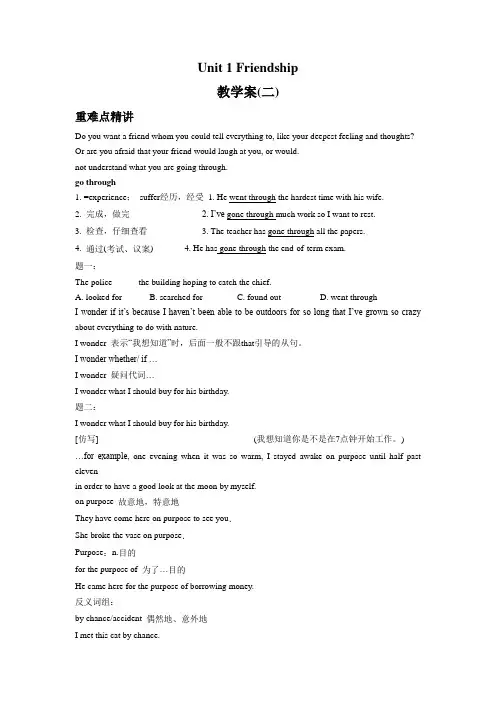
Unit 1 Friendship教学案(二)重难点精讲Do you want a friend whom you could tell everything to, like your deepest feeling and thoughts? Or are you afraid that your friend would laugh at you, or would.not understand what you are going through.go through1. =experience;suffer经历,经受1. He went through the hardest time with his wife.2. 完成,做完 2. I’ve gone through much work so I want to rest.3. 检查,仔细查看 3. The teacher has gone through all the papers.4. 通过(考试、议案) 4. He has gone through the end-of-term exam.题一:The police _____ the building hoping to catch the chief.A. looked forB. searched forC. found outD. went throughI wonder if it’s because I haven’t been able to be outdoors for so long that I’ve grown so crazy about everything to do with nature.I wonder 表示“我想知道”时,后面一般不跟that引导的从句。
I wonder whether/ if …I wonder 疑问代词…I wonder what I should buy for his birthday.题二:I wonder what I should buy for his birthday.[仿写] ___________________________________(我想知道你是不是在7点钟开始工作。
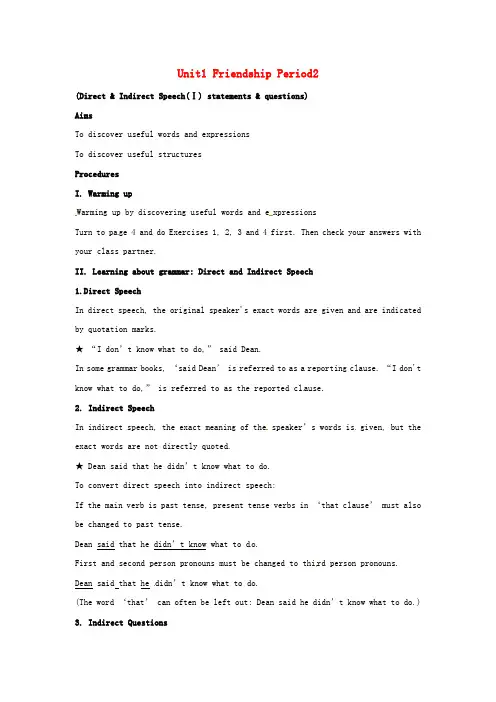
Unit1 Friendship Period2(Direct & Indirect Speech(Ⅰ) statements & questions)AimsTo discover useful words and expressionsTo discover useful structuresProceduresI. Warming upWarming up by discovering useful words and e xpressionsTurn to pa ge 4 and do Exercises 1, 2, 3 and 4 first. Then check your answers with your class partner.II. Learning about grammar: Direct and Indirect Speech1.Direct SpeechIn direct speech, the original speaker's exact words are given and are indicated by quotation marks.★“I don’t know what to do,” said Dean.In some grammar books, ‘said Dean’ is referred to as a reporting clause. “I don't know what to do,” is referred to as the reported cl ause.2. Indirect SpeechIn indirect speech, the exact meaning of the speaker’s words is given, but the exact words are not directly quoted.★Dean said that he didn’t know what to do.To convert direct speech into indirect speech:If the main verb is past tense, present tense verbs in ‘that clause’ must also be changed to past tense.Dean said that he didn’t know what to d o.First and second person pronouns must be changed to thi rd person pronouns. Dean said that he didn’t know what to do.(The word ‘that’ can often be left out: Dean said he didn’t know what to do.)3. Indirect QuestionsThe same rules apply to indirect questions as to indirect statements. The differenceis that a wh- clause is used instead of a that clause.Direct question: “Did Marama’s horse win a prize?” Owen asked.Indirect questions: Owen asked whether (or if) Marama’s horse had won a prize.Direct question: “Why won’t you marry me?” asked Donald.Indirect question: Donald asked her why she wouldn’t marry him.In telling a sto ry or recounting events, a speaker using direct speech has all the resources of intonation to produce a lively account. Because indirect speech is always speech reported by someone else, the account is more reserved and restrained. “What shall we do?” asked Bev.“Don’t worry, Bev,” said Duncan, “I’ve got a plan.”Bev asked Duncan what they should do. He told her not to worry and that he had gota plan.The ability to change direct speech into indirect speech is a u seful skill for those engaged in taking the minutes of a meeting or reporting on events.Direct spe ech: “First of all, I would like to thank everybody who helped with the fair. The results were very good, and we will now be able to buy two more computers.” Indirect speech: The principal said that he would like to thank everybody who had helped with the fair. He announced that the results were very good and that the school would now be able to buy two more computers.III. Discovering words and expressionsDo exercises 1, 2, 3 and 4 on page 4 and 5. Check your work with your partner’s. IV. Discovering structuresDo exercise 1 and 2. Check you r work with your partner’s.。
Unit 1 Friendship1.add用作及物动词或不及物动词,有“增加,增添”等意思,可构成如下短语:add up 把……加起来add up to 合计达;总计达add…to…把……增加到……上add to 增加(increase)1). ___________ something ________ what I’ve said please, John.2). Please __________ these figures for me.3). What he did has _____________ our difficulties.4). The cost _______________ 1000 yuan.2. upset v. 使不安,使心烦;打乱,搅乱(计划等);make sb. unhappy; change a planor situationadj. 心烦意乱的(不置于名词前);(胃等)不舒服的;(计划等)搅乱的 unhappy;worried; disturbede.g. The bad news upset him.Anne was very upset that the family had to move.3.get/ have sth done 使得某事完成Get the work finished by noon.My bike is broken. I have got to get it repaired.4.ignore: 忽视;不理睬( pay no attention to sth)e.g. He ignores the doctor’s advice and goes on smoking.5. calm: adj.平静的;镇静的;沉着的v.(使)平静;(使)镇静calm down: make one become calm使某人平静下来e.g. Let’s go and calm your angry brother down.It is calm weather. 无风的天气。
高中英语 Unit 1 Friendship Period 2Vocabulary学案新人教版必修1Unit1 Friendship Period2 Vocabulary学案新人教版必修1Learning goals: Master the important words and phrases in this unit、【预习案】XXXXX:重点单词及词组梳理1、upset adj、& vt、__________2、ignore vt、 _______ n 、_____________3、calm vt&vi、 ________ adj、 ______ 平静下来____________________4、concern vt、________ n、________ 关心,挂念_________________5、outdoors adv、___________6、一系列,一套___________________7、合计_________8、记下;放下_________9、面对面__________________10、故意__________11、经历;经受__________12、在黄昏_____________13、为了、、、___________14、遭受___________15、不再、、、_________________16、吸引人;入迷____ ______17、处于、、、的控制之中___________________18、adj、松的,松开的19、 adj、德国的; n、德国人20、 adj、整个的,完全的,全部的 adv、21、n、窗帘,门帘,幕布22、adj、积满灰尘的 _23、n、伙伴,合作者,合伙人24、 vi、&vt、恢复;痊愈___________25、 vi&vt、打包__________26、感激____ _____28、遛狗27、不得不,必须28、与、、、相处;进展 ________________29、做某事有困难____________________30、记下,放下,登记31、参加,加入32、故意33、对、、、厌烦______________________【探究案】XXXXX:单词即学即练1、upset adj、心烦意乱的;不安的,不适的 vt、使不安;使心烦,打乱(upset; upset)be upset about It upsets sb、 that It upsets sb、 to do sth、[即学即练1] (1)I ______ ______ ______ the bad news、(2)It ______ ______ that he had left without saying goodbye、 (3)If the rain keeps falling, it will ______ the whole plan、2、ignore vt、不理睬;忽视;不顾(强调“装作不知道或没看到”)ignorant adj、 ignorance n、 ignore sb、/sth、be ignorant of/about sth、=be in ignorance of sth、[即学即练2] (1)She saw him coming but she ________him、(2)He is ______ ______ farm life、=He is ___ _________ ______ farm life、3、concern vt、 (使)担忧;涉及;关系到 n、担心;关注;(利害)关系concerning prep、 show/express concern about/for have concern with with concern be concerned about/over/for be concerned with/in as/so far as、、、 be concerned[即学即练3] (1)Dont concern yourself ______ other peoples affairs、 (2)I always concern myself ______ my sons future、 (3)(3)As far as ____________, the sooner, the better、(4)____________ your letter, Im pleased to inform you of what you are interested in、4、series n、系列;连续 a series of 注意:(1)series 属于单复数同形的单词,类似的单词还有 means, species, works(工厂),deer, fish, sheep 等。
UNIT ONE FRIENDSHIP单词复习Ⅰ.单词拼写1.All the plan was ________(打乱) by the sudden change of the weather.2.We should all be ________(关心) about the state of our environment and we must do all we can to reduce pollution.3.After both sides have ________(冷静) down,they can use another key strategy.4.My son has ________(定居) happily in America.5.They ________(遭受) a great loss in the earthquake.Ⅱ.单项填空1.________ about the student,the teacher called his parents to find out why he was so often absent from class.A.Concerning B.ConcernC.Concerned D.To concern2.At the news that she won the first gold medal in the Olympic Games, the excited fans hardly ________ down.A.set B.calmedC.put D.took3.Studies show that people are more likely to ________ from back problems if they always sit before computer screens for long hours.A.suffer B.escapeC.graduate D.prevent4.In order to build the dam,they moved the local people and ________ them in another place.A.recovered B.ignoredC.set D.settled5.________ at the thought of young George's going to England alone,Mrs.Brown found it hard to go to sleep.A.To upset B.UpsetC.Upsetting D.Be upset短语复习1.add up合计(教材P1)Add up your score and see how many points you get.累加你的分数,看你能得多少分。
教师学科教案[ 20 – 20 学年度第__学期]任教学科:_____________任教年级:_____________任教老师:_____________xx市实验学校Module 1 Unit 1 Friendship嵊州二中裘小华一、教材分析本单元的中心话题是“友谊”,几乎所有的内容都是围绕这一中心话题展开的。
“热身”(Warming Up)部分以调查问卷的形式引导学生了解日常生活中朋友之间发生的真实问题以及解决这些问题的方法。
“读前”(Pre-reading)部分的几个问题启发学生对“友谊”和“朋友”进行思考,使学生明确不仅人与人之间可以做朋友,日记也可以成为人们的朋友。
“阅读”(Reading)部分ANNE'S BEST FRIEND以日记形式讲述了犹太女孩儿安妮的故事。
二战中为躲避纳粹的迫害,她和家人不得不藏身于荷兰阿姆斯特丹的一个小阁楼里,不能与外界接触,周围又没有可以推心置腹、与之深谈的朋友。
孤独之中她将日记作为朋友倾诉衷肠,在写日记的过程中寻求解决问题的办法。
“理解”(Comprehending)部分通过连句、多项选择和问答题的形式帮助学生对课文内容、细节进行更深入的理解。
“语言学习”(Learning about Language)部分教学本课重点词汇和重点语法项目。
“语言运用”(Using Language)部分的读两封信、听一段话、设计调查问卷、写信以及趣味写作,给学生提供了广阔空间去探讨友谊、友情,尤其是涉及到现实生活中被朋友误解、曲解,没有朋友的孤独寂寞等问题,既锻炼了学生的语言运用能力,又培养了学生发现问题、思考问题、解决问题的能力。
“小结”(Summing Up)部分引导学生从本单元的话题、词汇和语法等方面对所学内容进行总结(参考教学目的和要求栏目)。
“学习建议”(Learning Tip)部分鼓励学生养成写日记的习惯。
这样,一方面可以习得语言,另一方面还可以将日记作为自己的朋友表达感情与思想。
B1U1 Friendship 固学案2一.阅读理解AL ife affects friendships. As we grow, marry, fight in wars, move across the country or change jobs, old friendships fall away and new ones form. As long as we live, the things around us change, and as long as things change, friendships are affected.When we were children we had best friends. No matter what happened we were still friends. We live our lives, however, and do what life calls for us to do, and as we get older, memories fade, faces blur, and even friends' names from childhood are forgotten.Do you have a question about friendship? Do you wonder what to do with a friend who is no longer friendly? Perhaps you will see that you can't control others. If someone wants to be your friend, it is their choice. All you can do is treat them well and do the best for them when you are with them. Then you wish them well when they leave.You can talk to old timers and they will tell you that life is full of incredible joy and incredible sorrow, and that what bothers you today will one day becomes a memory and the sting(痛苦) will be gone. Seniors might tell you that you will learn more as you get older. They will tell you that friendships come and friendships go. Sometimes when they go it will hurt, but you will be okay with it. It's the way life works, after all.1. What can we learn about friendship, according to the text?A.Friendship can not be easily affected by one's family.B.Friends are always around us and will never go away.C.Friends in childhood are the best no matter what happens.D.Friends in childhood are sometimes forgotten by us.2.What should we do with friends who are no longer friendly according to the text?A.Do our best to control them and make them listen to us.B.Forget them and make new friends who have a lot in common with us.C.Find the reason why our friendship has changed.D.Care about them and do the best for them when we are together.3. What does the underlined words “old timers” mean in the Last paragraph?A. Old peopleB. Kind people.C. Rich people.D. Smart people4. The text mainly tell us ______ .A.how to face the changes in friendshipB.how to deal with unfriendly peopleC.that childhood friendship is valuableD.how to share happiness with friends5. What can you know about the author?A. He must have many friends.B. He gets well along with his friends.C. He seems to be reasonable.D. He doesn’t care when his friends go.BWhat can you do to spread peace and help get rid of prejudice(偏见)?In your own way you can only show love to your neighbors and classmates. However, the IKC (International Kids Club) activities below will help you learn about peace and love. Share them with your friends!(Please link to the following websites to help keep the world at PEACE!)Peace/Love EMail ActivitiesSend the IKC theme song!Share the message of the International Kids Club with your friends!Mail a Rainbow for Peace!Share the message of peace worldwide!Send PEACE email greetings!Peace/Love ArtsDictionary of Peace, Friendship, and Justice Quotes(语录). Famous quotes and proverbs.Peace songs and images.A history of peace.Peace/Love LanguageSay “I LOVE YOU”in any language.Say “PEACE”in any language.Peace/Love InformationHelp make PEACE worldwide!There are many simple but powerful ideas here to make peace and spread friendship!What is prejudice?Learn about it, and what you can do to avoid it!Peace/Love Clip Art(图库)FREE peacesymbol clip art.FREE animated(动画的) peacesymbol clip art.Other Peace Activity LinksPeace Page at Planetpals. Check out the Planetpals Earthzone for activities relating to peace, including a Peace Puzzle!Stories about kids making a difference. Add your story or project, or those of your class, to this site.6. The International Kids Club aims to ________.A.show kids how to make websitesB.offer kids language learning materialsC.invite kids worldwide to attend activitiesD.teach kids how to make a peaceful world7. Which website should you choose if you want to share information about IKC with others?A.Peace/Love Email Activities.B.Peace/Love Information.C.Peace/Love Language.D.Peace/Love Clip Art.8. If we join IKC activities, we can ________.A.learn the history of peaceB.travel to different countriesC.learn how to draw pictures of friendsD.learn different kinds of languages very quickly9. The writer wrote this passage to ________.A. advertiseB. informC. warnD. persuade10. Where can we read this passage?A.In a storybook. B.In a newspaper.C.On the Internet. D.In a magazine.第二节(共5小题;每小题2分,满分10分)根据短文内容,从短文后的选项中选出能填入空白处的最佳选项。